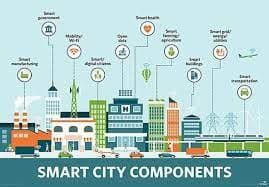
Smart Cities: The Future of Urban Living
With the world becoming increasingly urbanized, cities face a range of challenges such as population growth, infrastructure development, and environmental sustainability. To address these challenges, cities are turning to technology to create smarter and more efficient urban environments. In this article, we will explore the concept of smart cities, their benefits, and the challenges they face.
What are Smart Cities?
Smart cities are cities that use technology to enhance the quality of life of their citizens. This includes a range of technologies such as sensors, data analytics, and artificial intelligence, which are used to gather and analyze data in real-time. This data is used to improve various aspects of urban life, such as traffic flow, energy consumption, waste management, and public safety.
Benefits of Smart Cities
The benefits of smart cities are numerous. By using technology to optimize urban systems, smart cities can reduce congestion, energy consumption, and carbon emissions, making them more sustainable and environmentally friendly. They can also improve public safety by using sensors to detect and respond to emergencies in real-time. Additionally, smart cities can provide citizens with better access to public services, such as healthcare and education, by leveraging data and analytics to better understand their needs.
Challenges of Smart Cities
While smart cities offer numerous benefits, they also face several challenges. One of the primary challenges is privacy and security. As smart cities rely on collecting and analyzing vast amounts of data, there is a risk of data breaches and cyber attacks. Additionally, there is a concern about the misuse of data, with some people worried that the data collected by smart cities could be used to track and monitor citizens.
Another challenge is the cost of implementing smart city technologies. While many smart city initiatives are backed by government funding, they often require significant investment in infrastructure and technology, which can be expensive. Additionally, the deployment of new technologies can create jobs, but it can also lead to job displacement, particularly in low-skill industries.

Future of Smart Cities
The future of smart cities is full of possibilities. As technology continues to evolve, we can expect to see more innovative solutions that address the challenges facing cities. This includes the development of new technologies, such as autonomous vehicles and smart grids, which will help cities become even more efficient and sustainable.
Conclusion
In conclusion, smart cities are the future of urban living. By leveraging technology to optimize urban systems, smart cities can improve the quality of life for their citizens while also reducing their environmental impact. While there are challenges to implementing smart city technologies, the benefits are numerous, and the potential for innovation and improvement is vast. As cities continue to grow and evolve, the concept of smart cities will become increasingly important in shaping the future of urban living.
